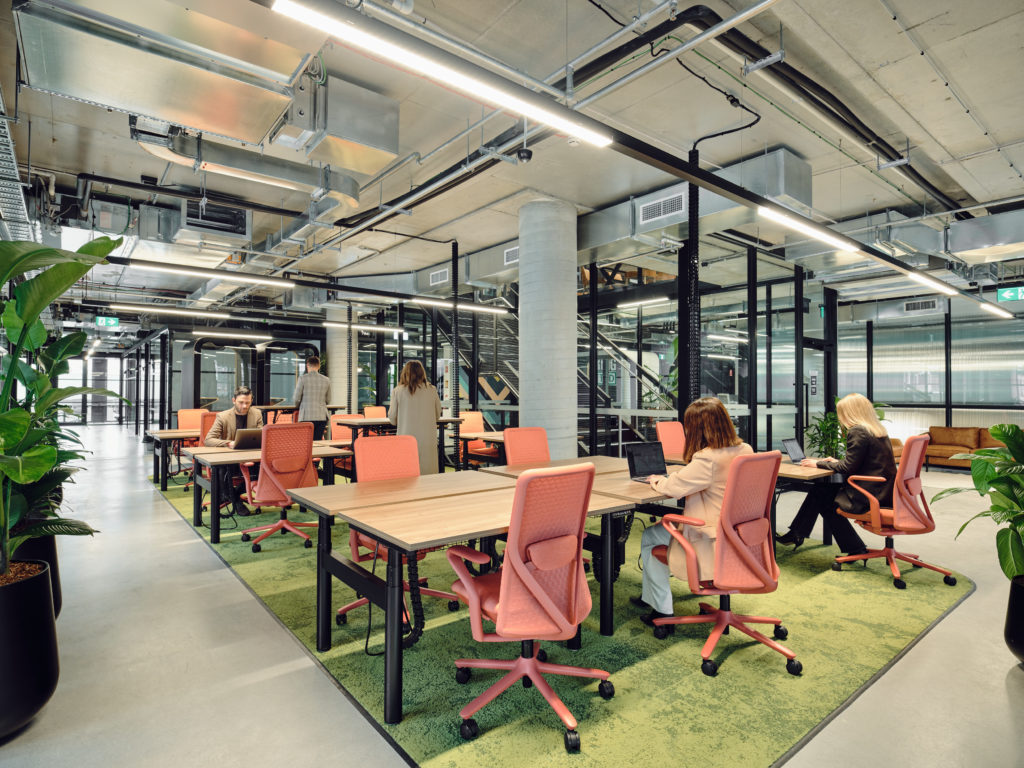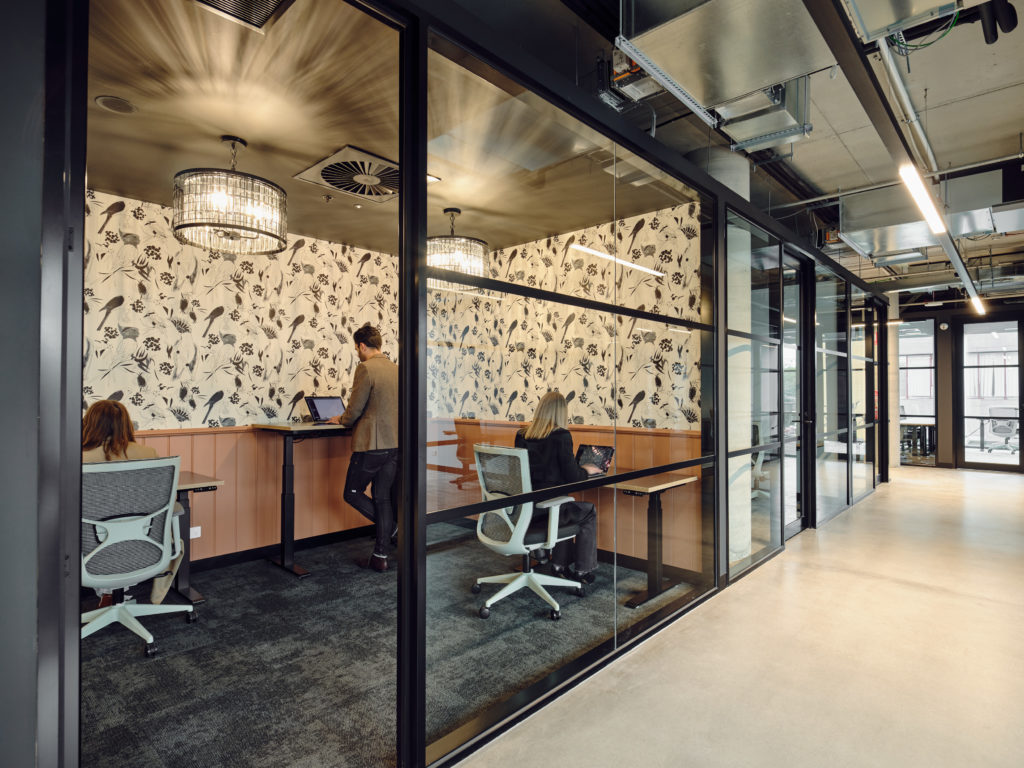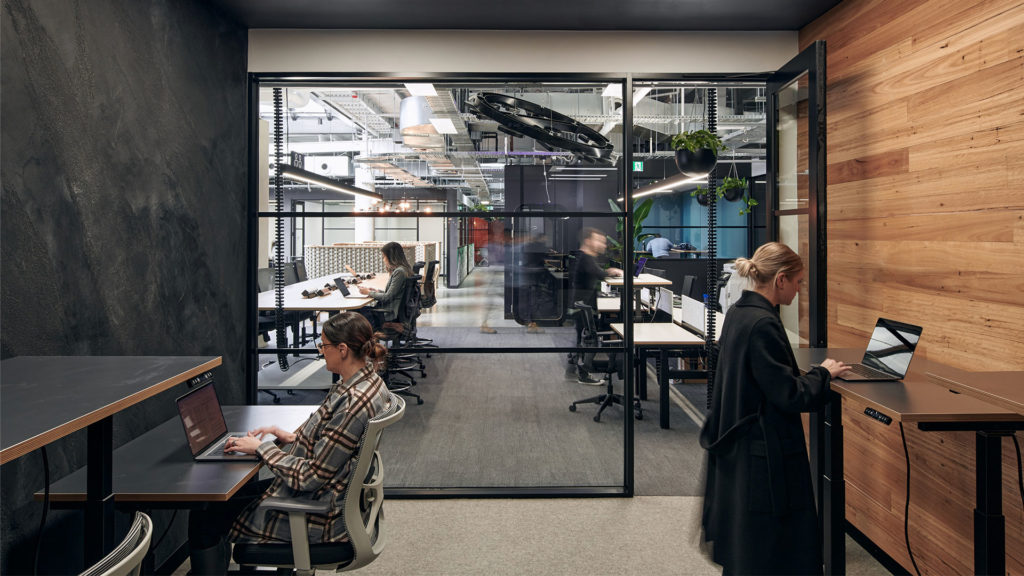In recent years, the traditional office space has undergone a significant transformation with more and more businesses opting for flexible office space solutions to meet the changing needs of their employees and customers.
In this guide, we will explore the world of flexible office spaces, their benefits, types, and how they are changing the work environment.
What is flexible office space?
Flexible office space refers to a workspace that offers businesses the option to lease space on a short-term or flexible basis.
These spaces are designed to be adaptable, allowing businesses to increase or decrease their office space as their needs change.
The modern workforce demands flexibility in their work environment. Flexible office spaces provide an environment that caters to this demand by offering the freedom to work remotely or from a shared workspace. Additionally, businesses require flexibility to adapt to changes in the economy, technology, and competition.
How flexible office spaces are changing the work environment
Flexible office spaces are changing the work environment by providing businesses with the ability to adapt to changing circumstances and meet the evolving needs of their employees and customers.
Flexible office spaces offer a range of benefits, such as cost-effectiveness, scalability, collaboration, and improved work-life balance. By providing affordable and flexible workspace solutions, businesses are able to operate more efficiently and effectively, while also attracting and retaining top talent.
By allowing employees to work from home or any location they choose, businesses are able to provide a more comfortable and flexible work environment that can lead to increased productivity and job satisfaction.
Remote work options can also help reduce commute times and promote a healthier work-life balance, which can lead to improved employee retention and engagement.
The Evolution of Office Spaces
Traditional office spaces are generally characterised by long-term leases, fixed workstations, and dedicated spaces for employees. These spaces can be expensive and may not meet the changing needs of businesses.
They can also be limiting for businesses that need to scale up or down quickly. Additionally, businesses may be required to commit to long-term leases that can be costly and inflexible.
The Emergence of Flexible Office Spaces
Factors contributing to the rise of flexible office spaces include changing business needs, advancements in technology, and the growth of the gig economy. As a result, flexible office spaces have emerged to meet these needs and offer a solution to the limitations of traditional office spaces.
Types of Flexible Office Spaces
There are different types of flexible office spaces, including coworking spaces, serviced offices, hybrid offices, and virtual offices. Each type offers unique features and benefits.
Coworking Spaces

Coworking spaces are a type of flexible office space that has gained popularity in recent years. These spaces offer shared work environments where individuals from different companies or industries can work side by side in a community-driven atmosphere.
Coworking spaces are typically designed to be modern and comfortable, with flexible workstations, meeting rooms, and shared amenities such as kitchens, lounges, and recreational areas.
One of the key benefits of coworking spaces is the opportunity for networking and collaboration. Working in a shared environment provides ample opportunities to meet and connect with other professionals, which can lead to new partnerships, projects, and business opportunities. Coworking spaces also offer a sense of community that can help reduce feelings of isolation and foster a sense of belonging among individuals who may otherwise work alone or remotely.
Coworking spaces are particularly popular among freelancers, entrepreneurs, and small business owners who may not have access to traditional office spaces. By offering a flexible and affordable workspace solution, coworking spaces can help support these individuals in building and growing their businesses. Additionally, coworking spaces often offer educational and networking events, which can help these individuals build their skills and connect with others in their industry.
Serviced Offices

Serviced offices are a type of flexible office space that provides fully furnished and equipped workspaces with professional support services. These spaces offer businesses the benefits of traditional office spaces, such as a professional environment and a dedicated space, with the flexibility and convenience of a short-term lease.
One of the key benefits of serviced offices is the ease and convenience they offer. Businesses can move into a serviced office space quickly and easily, without having to worry about purchasing or setting up furniture, equipment, or utilities. Serviced offices also offer a range of professional support services, such as reception, mail handling, and IT support, which can help businesses operate more efficiently and effectively.
Another benefit of serviced offices is the scalability they offer. As businesses grow and their needs change, they can easily upgrade or downgrade their office space without having to worry about the logistics of moving or renegotiating a lease. Additionally, serviced offices offer a range of lease terms, from short-term to long-term, which can help businesses adapt to changing circumstances or market conditions.
Serviced offices are particularly popular among small and medium-sized businesses, as well as startups and entrepreneurs, who may not have the resources or infrastructure to set up a traditional office space. By providing a fully equipped and supported workspace, serviced offices can help these businesses operate more efficiently and professionally, while also providing a cost-effective and flexible solution for their workspace needs.
Overall, serviced offices offer a range of benefits that can help businesses thrive. By providing a professional and fully equipped workspace, as well as a range of professional support services, serviced offices can help businesses operate more efficiently and effectively, while also offering the flexibility and convenience of a short-term lease.
Hybrid office space

Hybrid offices are a type of flexible office space that combines traditional and flexible office spaces. These spaces offer businesses the benefits of both worlds, with the privacy and security of a traditional office space, as well as the flexibility and convenience of a short-term lease.
Hybrid offices typically feature a combination of private office spaces and shared work areas, such as coworking spaces or hot desks. This provides businesses with the opportunity to have a dedicated space for their team, while also being able to take advantage of shared amenities and resources.
One of the key benefits of hybrid offices is the ability to balance privacy and collaboration. Private office spaces allow businesses to conduct confidential meetings and projects, while shared work areas provide opportunities for collaboration and networking.
Hybrid offices are particularly popular among businesses that need a mix of private and shared spaces, such as small and medium-sized businesses, startups, and entrepreneurs. By offering a range of lease terms and flexible workspace solutions, hybrid offices can help these businesses operate more efficiently and effectively, while also providing a cost-effective and flexible solution for their workspace needs.
Virtual Office Space
Virtual office space is a type of flexible office space that provides businesses with a remote work solution. Virtual office space providers offer businesses a range of amenities and services, such as a business address, mail and call handling, and access to meeting rooms or coworking spaces.
One of the key benefits of virtual office space is the ability to have a professional business address without the need for a physical office space. This can help businesses to establish a professional presence and credibility, which can be particularly beneficial for startups, entrepreneurs, and small businesses.
Virtual office space also offers a range of cost savings, as businesses can avoid the overhead costs associated with a traditional office space, such as rent, utilities, and maintenance. By providing a remote work solution, virtual office space can help businesses operate more efficiently and effectively, while also promoting work-life balance and flexibility for employees.
Virtual office space is particularly popular among businesses that have a remote workforce, or those that don’t require a physical office space but still need a professional presence. By providing a range of amenities and services, virtual office space providers can help businesses to operate more efficiently and effectively, while also reducing overhead costs.
Advantages of Flexible Office Spaces
Cost-Effectiveness
Flexible office space is a cost-effective solution for businesses that need office space but don’t want to commit to a long-term lease or invest in the infrastructure required for a traditional office space. By offering short-term or flexible lease options, businesses can save money on overhead costs such as rent, utilities, and maintenance.
Flexible office space can also help businesses to reduce their capital expenditures. With traditional office spaces, businesses typically need to invest in furniture, equipment, and utilities, which can be expensive and time-consuming. Flexible office space providers, on the other hand, offer fully furnished and equipped workspaces, which means that businesses can avoid these capital expenditures.
Flexibility and Scalability
One of the key advantages of flexible office space is that it allows businesses to scale up or down as needed.
This means that businesses can avoid the expense of leasing more space than they need, or having to move to a larger space when they outgrow their current one. Flexible office space providers also offer a range of amenities and services, such as IT support, cleaning services, and reception services, which can help businesses save money on overhead costs.
Collaboration and Networking
Collaboration and networking are key advantages of flexible office space. By providing a community-driven atmosphere, flexible office space providers encourage collaboration and networking among individuals from different companies and industries.
Coworking spaces, in particular, are designed to promote collaboration and networking. Working in a shared environment provides ample opportunities to meet and connect with other professionals, which can lead to new partnerships, projects, and business opportunities. Coworking spaces also offer a range of community events, such as educational workshops, networking events, and social gatherings, which can help individuals build their skills, expand their network, and foster new relationships.
Collaboration and networking are also promoted in serviced offices, as businesses may be sharing space with other companies or individuals. This provides opportunities to connect and collaborate with other professionals in the same building, which can lead to new partnerships or projects.
Improved Work-Life Balance
Flexible office spaces are designed to meet the changing needs of the modern workforce and help promote a better work-life balance. One of the key benefits of flexible office spaces is the option for remote work. This allows employees to work from home or any location they choose, which can help reduce commute times and allow for more flexibility in scheduling.
Remote work also allows for a more comfortable work environment. Employees can work in a space that is personalized and tailored to their needs, which can help reduce stress and improve overall well-being. Additionally, remote work can help employees better balance their work and personal lives, as they can more easily attend to personal responsibilities while still meeting work obligations.
Flexible office spaces also offer a variety of amenities and resources that can contribute to a healthier work environment. For example, many flexible office spaces offer access to fitness facilities, healthy food options, and relaxation areas, which can help reduce stress and promote physical and mental wellness.
By promoting a better work-life balance, flexible office spaces can help reduce employee burnout and increase overall job satisfaction. When employees feel that they have the flexibility and resources they need to manage their work and personal lives effectively, they are more likely to be engaged and productive at work.
Overall, flexible office spaces offer a range of benefits that can help support work-life balance and promote a healthier, more sustainable work environment. By offering remote work options and access to amenities that support well-being, businesses can help their employees thrive both personally and professionally.
How to Find Right Flexible Office Space
Finding the right flexible office space can be a crucial decision for businesses, as it can impact their productivity, efficiency, and overall success. Here are some key factors to consider when choosing the right flexible office space:
- Determine Your Needs:
Assessing your space requirements and identifying essential amenities is a crucial step in finding the right flexible office space. Consider the number of employees, your workspace requirements, and any specific needs such as access to meeting rooms or video conferencing equipment. - Location and Accessibility:
Choosing the right location for your flexible office space is important. Consider factors such as accessibility to public transportation, proximity to clients and partners, and the overall convenience of the location. - Budget Considerations:
Estimating costs and comparing options is essential when choosing the right flexible office space. Consider your budget, and look for providers that offer a range of lease terms, amenities, and services that fit your needs. - Touring and Evaluating Spaces:
Visiting potential spaces and evaluating the community and culture is a critical step in finding the right flexible office space. Consider factors such as the overall ambiance of the space, the level of activity and interaction among members, and the quality of amenities and services. - Implementing Flexible Office Spaces in Your Organization:
Once you have found the right flexible office space, it is important to manage the transition from traditional spaces effectively. Consider implementing remote work policies, ensuring effective communication, and monitoring and evaluating productivity and employee satisfaction.
At CreativeCubes.Co, we offer a range of flexible office space solutions designed to meet the diverse needs of modern businesses.
Our spaces are designed to provide affordable and flexible workspace solutions, with a range of amenities and services to support productivity and collaboration. Our team is committed to helping businesses find the right flexible office space for their needs, and we are dedicated to providing exceptional customer service and support.
Implementing Flexible Office Spaces in Your Organisation
To successfully implement flexible office spaces in your organisation, it is important to transition from traditional spaces gradually and assess the needs of your employees.
Businesses should also manage flexible work arrangements, such as remote work policies, and ensure effective communication to maintain productivity and employee satisfaction. Monitoring and evaluation can help businesses track productivity and adapt to feedback.
In Summary
Flexible office spaces are revolutionising the modern work environment by providing affordable, scalable, and collaborative workspace solutions. Businesses can benefit from cost-effectiveness, flexibility and scalability, collaboration and networking, and improved work-life balance.
By finding the right flexible office space and implementing it effectively, businesses can embrace flexibility for success.
Frequently Asked Questions (FAQs)
Flexible office spaces offer short-term or flexible lease options, customisable spaces, and a community-driven atmosphere, while traditional office spaces require long-term leases and may not meet the changing needs of businesses.
Flexible office spaces offer remote work options that allow employees to work from home or any location they choose, promoting a healthier work environment and better work-life balance.




